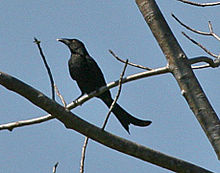The Wallacean drongo or Greater Wallacean drongo (Dicrurus densus) is a species of bird in the family Dicruridae. It can be found in the countries of Indonesia and East Timor. It was formerly considered to be conspecific with the hair-crested drongo (Dicrurus hottentottus).
| Wallacean drongo | |
|---|---|

| |
| Scientific classification | |
| Domain: | Eukaryota |
| Kingdom: | Animalia |
| Phylum: | Chordata |
| Class: | Aves |
| Order: | Passeriformes |
| Family: | Dicruridae |
| Genus: | Dicrurus |
| Species: | D. densus
|
| Binomial name | |
| Dicrurus densus Bonaparte, 1850
| |
Its natural habitats are subtropical or tropical moist lowland forests, subtropical or tropical mangrove forests, and subtropical or tropical moist montane forests.
Conservation status
editThe Wallacean drongo has a very large range and does not approach the thresholds for Vulnerable under the range size criterion. Its extent of occurrence is greater than 20,000 km2. The population trend is not known but it is not believed to be declining sufficiently rapidly, and the population size is believed to be large enough for it to not qualify as Vulnerable using the population size criterion. For these reasons the species is classified as Least Concern by the IUCN.[2]
Subspecies
editThe following six subspecies are recognized:[3]
- D. densus densus (Bonaparte, 1850) Wallacean drongo
- D. densus vicinus (Rensch, 1928) Lesser Sunda drongo
- D. densus bimaensis (Wallace, 1864) Bima drongo
- D. densus sumbae (Rensch, 1931) Sumba drongo
- D. densus kuehni (E. J. O. Hartert, 1901) Tanimbar drongo
- D. densus megalornis (G. R. Gray, 1858) Moluccan drongo
- Gorong, Watubela Is., and Kai Is., in southwest Moluccas
References
edit- ^ BirdLife International (2017). "Dicrurus densus". IUCN Red List of Threatened Species. 2017: e.T22706990A118759558. doi:10.2305/IUCN.UK.2017-3.RLTS.T22706990A118759558.en. Retrieved 12 November 2021.
- ^ "BirdLife Data Zone".
- ^ "Wallacean Drongo (Dicrurus densus) | the Internet Bird Collection". ibc.lynxeds.com. Archived from the original on 2010-04-16.
External links
edit- Photos, videos and observations at Cornell Lab of Ornithologys Birds of the World
